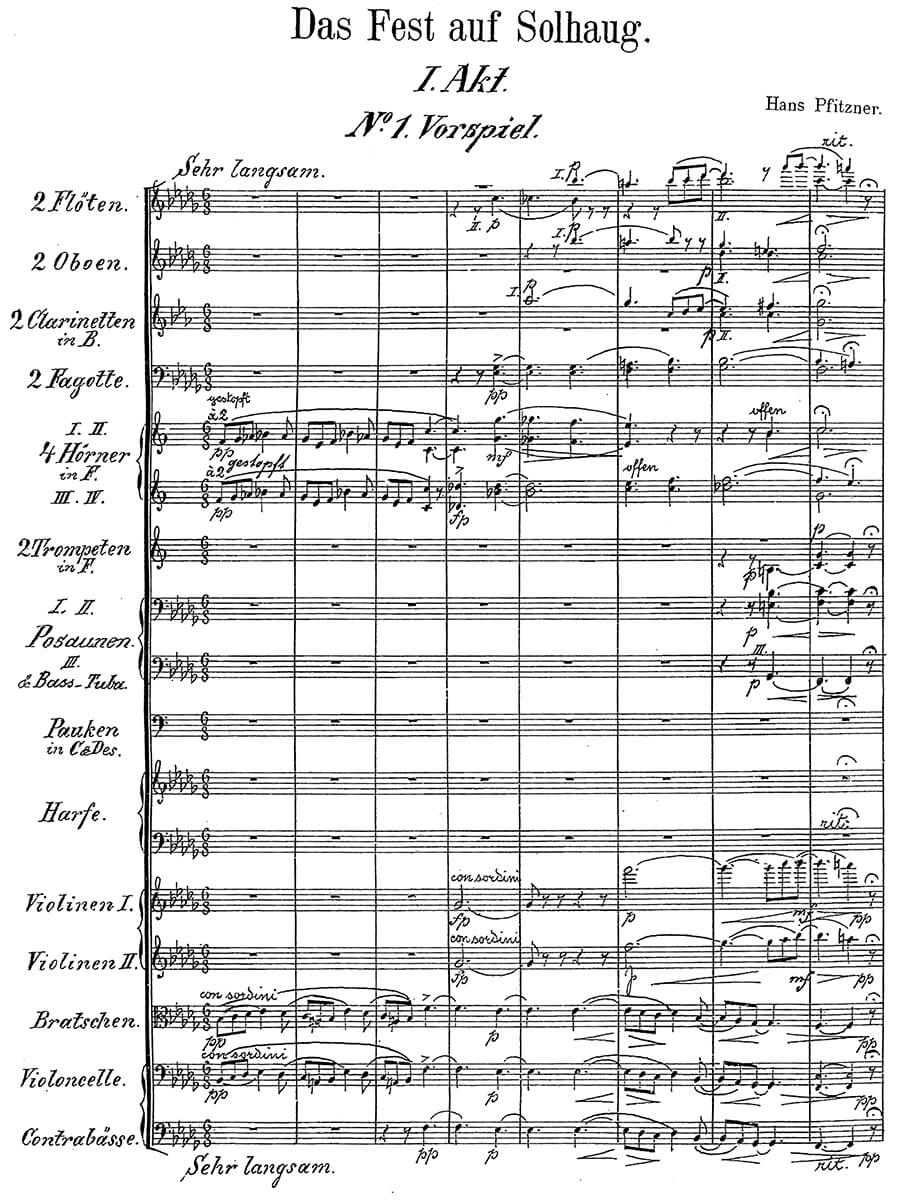Stage music to Henrik Ibsen’s drama ‘Das Fest auf Solhaug/The Feast at Solhaug’
Pfitzner, Hans
36,00 €
Preface
Pfitzner, Hans – Stage music to Henrik Ibsen’s drama ‘Das Fest auf Solhaug/The Feast at Solhaug’
(b. Moscow, 5 May 1869 – d. Salzburg, 22 May 1949)
H. Ibsen (1828-1906)
(1889-90)
Act I
I Prelude (p. 1)
II Margit’s Scene. Melodram and Song (p. 21)
III Finale (p. 37)
Act II
IV Prelude (p. 57)
V Chorus „He entices out of doors“ (p. 77)
VI Song „I seemingly drove over water“ (p. 89)
VIb Melodram (p. 93)
Akt III
VII Prelude (p. 109)
VIII Conclusion (p. 141)
The music to Henrik Ibsen’s early drama ‘The Feast at Solhaug’, composed in 1889-90, is, together with the Sonata Op. 1 for cello and piano, the first real testimony of maturity in Hans Pfitzner’s oeuvre. The prelude to the first act in particular already shows him at the full height of his art, which is as subtle as it is vulnerable. At the same time, its creation is an excellent example of how a young artist can be disappointed in his naivety towards the ways of the world.
Pfitzner reports in ‚Bilder und Eindrücke meines Lebens‘ (second publication in ‚Hans Pfitzner. Reden, Schriften, Briefe’, edited by Walter Abendroth [Berlin, 1955]) in the chapter ‘Worüber ich alles nicht nachgedacht habe’ [All of which I have not thought about] about the compositions of his conservatory time in Frankfurt am Main. Thereby, first of all, the talk is about: the ‘Jugendlieder’ [juvenile lieder], the early Cello Concerto (“whose orchestral part I have never heard and which has never been performed in public”), the women’s chorus with alto solo and orchestra ‘Der Blumen Rache’ [The Flowers’ Revenge] (“which had been recommended by Knorr for an examination concert, but rejected by Scholz, without proper justification […] I only heard ‘Der Blumen Rache’ for the first time during my time in Strasbourg, i.e. about twenty years after it was written down”) and the ‘Scherzo for Orchestra’ written in a few weeks as a replacement for ‘Der Blumen Rache’ (“It was the only work that I heard played during my time at the conservatory – apart from piano songs, of course”). Then Pfitzner gets to the main point of that period: “The ’biggest throw’ of my apprenticeship years, however, was, besides my cello sonata printed as Opus 1 by Breitkopf & Härtel on the recommendation of Iwan Knorr, my first dramatic composition: the complete music for Ibsen’s drama ‘Das Fest auf Solhaug’. The musical language of this young man’s work strikes for the first time the passionate notes already prepared in the cello sonata and in some piano songs, fully and in great style. This work forms the transition from the actual youth compositions to the works of maturity. Its creation has enabled me to write my own style and to speak my own musical language, which has as little to do with Wagner as with Bellini, in my first large opera work, ‘Der Arme Heinrich’ [Poor Henry].
I wrote the ‘Fest auf Solhaug’ in my twentieth year, it covers the time of my last months in the conservatory and the first months after leaving that institution. I had proven with the Scherzo that I could also write on commission, and there was no room in Scholz’s ’reformatory for geniuses’ for the children of the muse produced by free will. The ‘Fest auf Solhaug’, however, had taken my fancy. The harsh but great and genuine poetry of the Northerner, into which I was soon to penetrate even more deeply, stimulated my dramatic impulses in such a way that ideas flowed easily to me and I went to work undaunted. What I showed to Knorr [Iwan Knorr, 1853-1916], however, was met with such coldness, and the changes he suggested to my sketches were so unintelligible to me that I finally said goodbye to my modesty and to my belief in authority and told myself that there was nothing more for me to learn here and that there could only be one kind of criticism left for me: self-criticism, which I had to practice and learn to trust in. In addition, the following incident made my departure much easier: The administrative director of the institution, who was cut from the same cloth as Scholz [Bernhard Scholz, 1835-1916], had me come to him one day and spoke to me supercilioiusly: “Mr. Pfitzner, your free scholarship will expire in the coming month; have you ever thought about it?” No, I had not thought about it yet. I used to think about other things. But I wanted to leave.
Read full preface / Das ganze Vorwort lesen > HERE
Score Data
| Edition | Repertoire Explorer |
|---|---|
| Genre | Choir/Voice & Orchestra |
| Pages | 160 |
| Size | 210 x 297 mm |
| Printing | Reprint |
